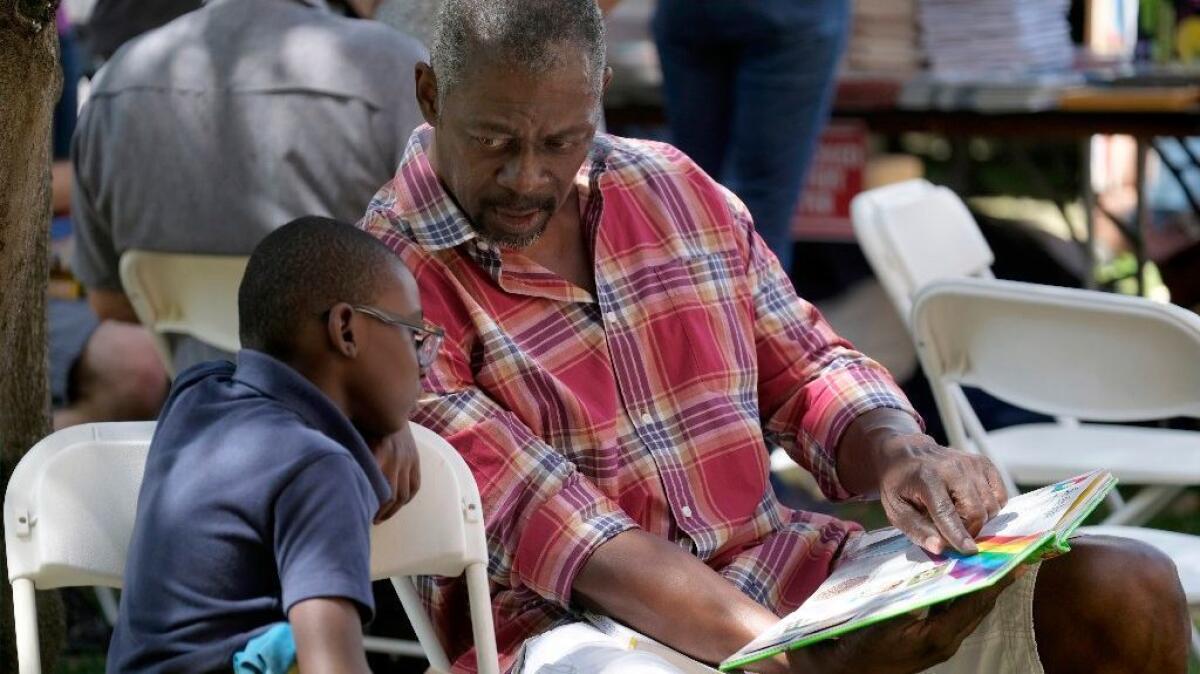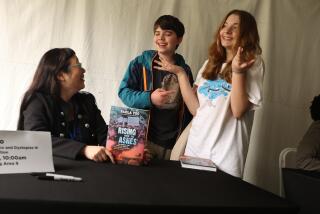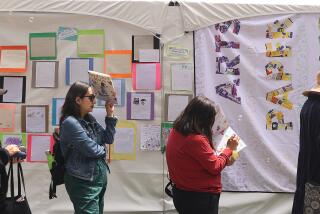More than 150,000 explore everything from politics to poetry as L.A. Times Festival of Books comes to a close

- Share via
Victor Rios, a sociology professor at UC Santa Barbara, believes that positive change in the criminal justice system is possible only when authority figures stop placing labels on youth from underprivileged neighborhoods and show more empathy.
“We shouldn’t label them as being ‘at risk,’ we should label them as being ‘at promise,’’’ said Rios, author of “Human Targets: Schools, Police, and the Criminalization of Latino Youth.” “We should try to help them see themselves as productive citizens.”
Rios was one of several writers and editors who participated in a panel discussion titled “Police, Prisons and Justice” on the second and final day of the Los Angeles Times Festival of Books at USC. It was one of multiple discussions, lectures and workshops on everything from politics to poetry that took place throughout the day.
More than 150,000 people from California and across the country attended the two-day book festival — the largest in the nation — under clear skies and temperatures that fluctuated from a scorching 90 degrees in downtown L.A. on Saturday to the high 70s Sunday.
Sandi Latimer, 73, flew in from Columbus, Ohio, for the festival and attended the panel discussion on criminal justice. She said she found it compelling because of her passion for investigations.
“My last husband said I missed my calling,” she joked.
The “Writing Across Genres: Humanizing Conflict” panel discussion included Ben Ehrenreich, a reporter who spent a year living in the Palestinian territories; Amy Wilentz, a journalist and author whose memoir is based on her time in Haiti; and Maximilian Uriarte, a Marine Corps veteran who recounted his war experiences in Iraq.
The panelists read excerpts from their books and discussed the dangers of holding preconceived notions when writing about other cultures.
“I wrote ‘The White Donkey’ to combat a lot of war story stereotypes...I want to be honest about my experience, it’s not action-packed,” Uriarte said.
His motivation, he said, was to show the mundane aspects of the war in Iraq through the lens of the Marine Corps.
For Ehrenreich, embedding himself in the West Bank for a year to write “The Way to the Spring” was a different approach to humanizing people who live in conflict zones.
Part of his motivation, he explained, was to shatter the dominant narrative in the West about the Israeli-Palestinian conflict.
“Most Americans have their minds made up, we can’t talk about it at dinner,” he said. “It’s a painful discussion on both sides.”
Referring to Israel’s separation barrier with the West Bank, Ehrenreich said his job as a journalist is to metaphorically “smash walls,” so people on both sides can see each other.
For those looking to engage in thought-provoking discourse without sitting in on lectures, many booths on science, art and religion were stationed throughout campus.
At the “Atheists United” table, 28-year-old author David McAfee chatted with curious festival-goers about his beliefs. This was McAfee’s fourth year participating at the Festival of Books, an experience he said was enriching.
“I get to interact with different people, some who disapprove and others who don’t,” he said.
The big hit at the “Why Islam?” table was the option for women to try on the hijab — a headscarf traditionally worn by some Muslim women.
Cynthia Sance, 25, sat on the chair inside the booth while a female visitor covered her hair with a pink and black hijab. It was her first time wearing one.
Afterward, Sance posed for a picture and was told she could keep the headscarf.
“I’m going to keep it on during the festival,” she said. “It feels different, yet fresh.”
Twitter: @melissaetehad
More to Read
Sign up for Essential California
The most important California stories and recommendations in your inbox every morning.
You may occasionally receive promotional content from the Los Angeles Times.











